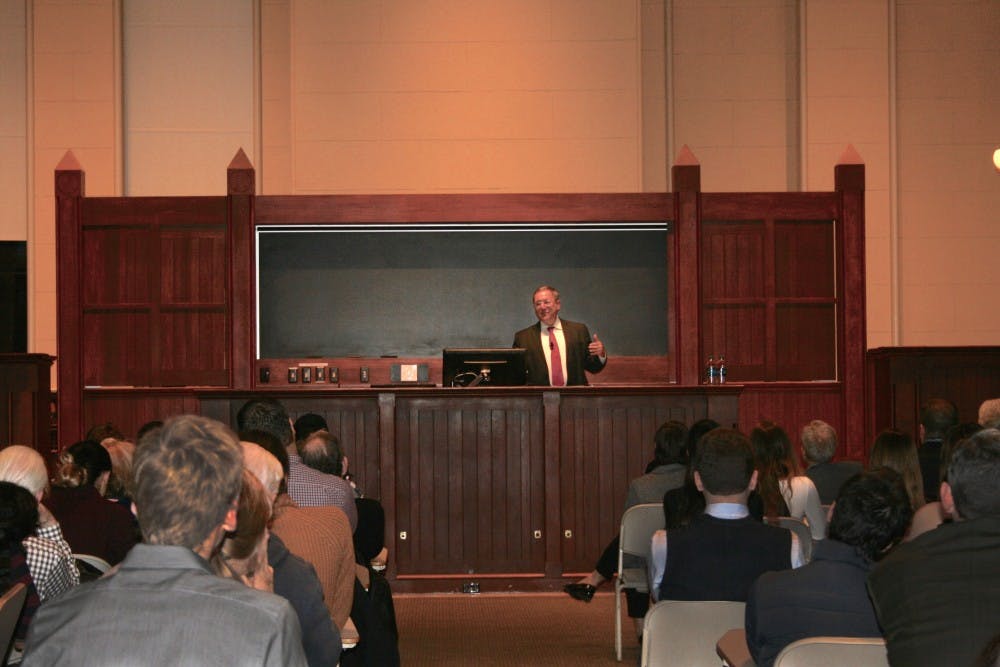
New York Times National Security Correspondent called Trump a "sea of contradictions" and took note of his "transactional world view" in a lecture on Tuesday evening.
Credit: Lauren TappanThe national security correspondent for The New York Times, David Sanger, had a lot to say about Trump’s foreign policy views when he spoke at Penn on Tuesday night.
“Trump is a sea of contradictions,” Sanger said in the lecture. He had explained in an interview with The Daily Pennsylvanian prior to the event that Trump’s aggressive stance on how to defeat the Islamic State directly contradicts his “America First” approach, which encourages isolationism and withdrawal from international commitments. He said Trump “hasn’t been pressed much in the debates or on TV on how you square the question of the ‘we keep people at home and we keep people back, yet here’s what we will do to ISIS.” He also added, “I don’t blame him for that — he has not had to think of these sort of things for a living — but I think he’s going to discover it’s pretty complicated.”
Sanger also spoke about what he perceives to be the real estate-based nature of Trump’s policy views. He emphasized his belief that Trump largely overlooks and risks strategic benefits of alliances to instead focus on monetary compensation for American support.
“It was pretty clear that Mr. Trump’s view of the world is very transactional, which is not really that surprising if you’ve spent your life as a real estate developer,” Sanger said in the interview. “And so the concept of building up alliances, which has been some of the fundamental underpinning of American foreign policy since the post-World War II era, is somewhat missing from his world view.”
Sanger stressed how complex the international scene will be for whoever becomes president, and said that because of Trump’s contradictions and transactional worldview, “we don’t understand what kind of foreign policy president Mr. Trump would be.”
He went on to contrast Clinton’s plan with Trump’s.
“Secretary Clinton takes a much more traditional, alliance-building view,” Sanger said in the interview, describing her as “more hawkish in the Middle East ... more confrontational with the Chinese and ... less likely to get frozen by concerns about what the escalation ladder will look like.” He added, “But her view is almost a Republican view. It is very much more similar to what you would have heard from, say, maybe Mitt Romney, but certainly from McCain.”
He added that any improvements Clinton would make over Obama’s foreign policy would be subtle and not likely noticed, and said she is still a firm member of the establishment.
Associate Director for the Political Science Undergraduate Program Eileen Doherty-Sil said in an interview that she also believes the candidates have “such different worldviews.”
Doherty-Sil, who helped plan the event, also said she wanted to bring in Sanger because of the uniqueness of the election.
“This one seems pretty different — at least, that’s what the students are telling me, and we wanted to explore that,” she said.
Later in the lecture and question-and-answer session, Sanger left the topic of the candidates to speak about the implications of the Russians’ breach of Democratic National Committee email system. He said it should shift public and governmental concern from that of a Russian cyberattack on the electrical grid to that of subtle acts such as interference in an election.
In both the interview and lecture, Sanger also talked about potential party realignment. He said the Democratic Party must reassess its core values and determine which foreign policy strategy it will align itself with in the future — and the same goes for the Republican Party.
“The Republican Party has sort of walked past the fact that Trump is rewriting their traditional scripts. So what does the Republican Party do in the next cycle ... Do you go back to a party that looks more like the foreign policy of George H.W. Bush or does Trump have lasting impact?”
Edward Mansfield, director of the Browne Center — which hosted the event — spoke in an interview about why he supported inviting Sanger to speak.
“We want people who are sophisticated commentators but at the same time are interested in reaching the broader Penn community, especially the undergraduate community,” he said. “He has an excellent track record of exactly that sort of thing.”
Mansfield said he thought a lecture on the election’s impact “was a terrific idea and that people in the Penn community would benefit and be interested in an assessment of foreign policy implications and positions of the candidates” and added that Sanger “is a very distinguished individual who’s been analyzing and commenting on international affairs for some time.”
The Daily Pennsylvanian is an independent, student-run newspaper. Please consider making a donation to support the coverage that shapes the University. Your generosity ensures a future of strong journalism at Penn.
Donate







